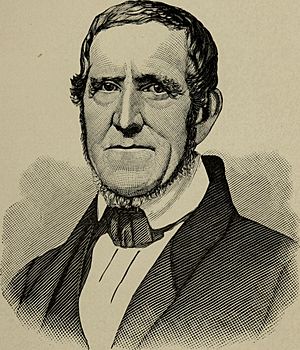Eusebius Barnard facts for kids
Eusebius Barnard (born July 13, 1802 – died October 2, 1865) was an American farmer who played a big role in the Underground Railroad. He was like a secret guide, helping hundreds of enslaved people find their way to freedom in Chester County, Pennsylvania. Barnard was also a minister for a group called the Progressive Friends. He strongly believed in equal rights for women, stopping alcohol use (temperance), and ending slavery (abolition). Today, there's a special sign, called a Pennsylvania state historical marker, outside his old home in Pocopson Township. It was put there on April 30, 2011, to remember his important work.
Contents
Eusebius Barnard's Early Life
Eusebius Barnard was born in Chester County, Pennsylvania in July 1802. His family were Quakers from England who had moved to the area in 1686.
He went to the Westtown Boarding School. Eusebius was a very smart student. When he was just 13 years old, his brother Joseph asked him to teach at the Locust Grove school. Eusebius left school early to focus on farming. His old stone farmhouse in Pocopson Township is still standing today.
A Champion for Change
Barnard had strong beliefs about fairness and equality. Because of his views, especially about ending slavery, he was removed from the Kennett Friends Meeting in 1852. Other people who also wanted change, like William Barnard and Isaac Mendenhall, were removed too.
Eusebius Barnard and these other Quakers then started a new group. They became ministers and helped create the Longwood Meeting of Progressive Friends in 1854. This group believed in many important causes. Besides ending slavery, Barnard also supported women's right to vote (women's suffrage). He also supported the temperance movement, which worked to reduce or stop the use of alcohol.
Barnard was also part of the Locust Grove Lyceum. This group met at the local schoolhouse. They talked about books, science, education, and important issues of the day. He also signed a paper in 1848 to divide Pennsbury Township. This led to the creation of Pocopson Township.
Helping People on the Underground Railroad
The Underground Railroad was a secret network. It helped enslaved people escape to freedom. For Eusebius Barnard, this was a family effort. He, his sons, and his daughters helped hundreds of people seeking freedom. They gave them a safe place to stay.
The family took big risks to help these people. They guided them to the next safe house. These safe houses were often in towns like Strasburg or East Bradford. Sometimes, they helped large groups of up to 17 people at once. These groups included men, women, and children.
Barnard's first wife, Sarah Painter Barnard, was also very involved. His second wife, Sarah Marsh Barnard, helped too. Both women came from families who strongly opposed slavery. They actively helped guide freedom seekers to safety. Eusebius and Sarah P. had eight children together.
Eusebius Barnard passed away at his home in Pocopson in October 1865. He, Sarah P., and Sarah M. are buried at Longwood Cemetery in Kennett Square.
Barnard's Lasting Legacy
The Eusebius Barnard House is a stone farmhouse built in the early 1800s. It is located on South Wawaset Road in Pocopson Township. Since October 2022, it has been part of the National Park Service's National Underground Railroad Network to Freedom. This means it's recognized as an important historical site for the Underground Railroad.
The house stayed in the Barnard family until 1944. Later, in 1957, it was sold to the Chester County government. In 2008, Chester County gave the house and 68 acres of land to Pocopson Township. Today, the Kennett Underground Railroad Center and Museum is located in Barnard's house.
A special Pennsylvania state historical marker was placed outside Barnard's home. It was put there on April 30, 2011, to honor his important work.
See also
- List of Pennsylvania state historical markers in Chester County
 | Leon Lynch |
 | Milton P. Webster |
 | Ferdinand Smith |


